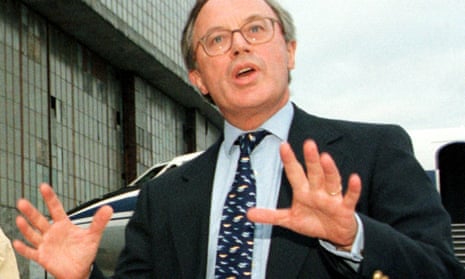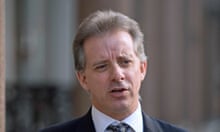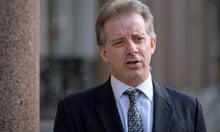Cool, unruffled and polite, Sir Andrew Wood is every inch the Foreign Office mandarin, and not a diplomat ordinarily associated with the kind of cold war-style alleged sex scandal currently embroiling the president-elect, Donald Trump.
Yet to his evident discomfort, Wood has found himself thrust front and centre of a story that has generated global interest and sent shudders around Washington and Whitehall on the eve of an inauguration that will be stained by the furore.
Wood, 77, knew and respected Christopher Steele, the ex-MI6 officer who wrote the 35-page dossier that contained lurid allegations about Trump. Wood also spoke to the Republican senator John McCain about the claims.
The two men had met at an “international security forum” in Canada last November – Wood addressed delegates about Ukraine, McCain about Syria. But it was their private discussion about Russia that set in train this week’s remarkable events.
Wood shared with the veteran senator what he knew about the dossier and warned that if any of its central claims were true, Trump could be blackmailed by Russia. McCain was worried enough to seek out a copy of the documents for himself – which he then passed to the FBI.
Wood, the UK ambassador to Moscow between 1995 and 2000, explained the sequence of events in various media interviews on Friday – using the kind of moderated language that no doubt helped persuade McCain, and then the heads of the US intelligence agencies, that both President Obama and the brash incumbent, needed to know what was being circulated.
At a point when the British government was hoping the story would go away, Wood lobbed the ball back into the billionaire’s court.
He told the Guardian the report’s key allegation – that Trump and Russia’s leadership were communicating via secret back channels during the presidential campaign – was eminently plausible.
“I think it has to be disproved, rather than anything else,” he said.
Of Steele, who compiled the dossier last year at the behest of Trump’s political enemies, Wood told BBC Radio 4’s Today programme on Friday morning he knew him to be a “very competent professional operator … I do not think he would make things up. I don’t think he would necessarily always draw the correct judgment, but that’s not the same thing at all.”
Later, Wood was more generous in his assessment of Steele, telling the Guardian he “rated his judgment”.
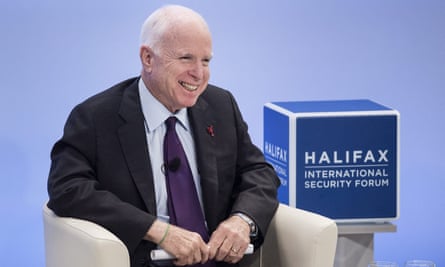
“I take the report seriously. I don’t think it’s totally implausible. It’s conceivable he [Steele] has been duped or has exaggerated what his sources have been telling him. But I can’t really believe the dupe argument. Why would they [the Kremlin] bother?”
These are questions not currently being entertained by Trump – not if his latest tweets are anything to go by.
Totally made up facts by sleazebag political operatives, both Democrats and Republicans - FAKE NEWS! Russia says nothing exists. Probably...
— Donald J. Trump (@realDonaldTrump) January 13, 2017
It now turns out that the phony allegations against me were put together by my political opponents and a failed spy afraid of being sued....
— Donald J. Trump (@realDonaldTrump) January 13, 2017
All of which suggests the debate about the dossier and its unsubstantiated claims are likely to rumble on in the US and the UK – which is likely to frustrate Downing Street as it tries to build bridges with a new, unpredictable administration.
It was GCHQ that tipped off the US about Russia hacking the Democratic Convention, and it was an MI6 officer whose work on Trump has caused the combustible businessman such embarrassment this week.
No wonder, then, that Downing Street has been so reluctant to engage on the subject this week, and MI6 has been in even less communicative than usual. For them, Wood’s intervention is no help at all. But they know him, and his credentials. Like it or not, Wood’s opinions carry weight. Why?
For five years he had one of the toughest jobs in Britain’s foreign service: our man in Moscow. His stint in the Russian capital coincided with political and economic crisis and the very public waning of Russia’s leader Boris Yeltsin.
Wood packed his bags and left Russia just as a new and different president took power. His name was Vladimir Putin and he was a former career spy.
Over the past 17 years Wood has been a cool-eyed observer of Russian affairs, as the country has gone from chaotic semi-democracy to a repressive state. The ambassador is not usually in the headlines. He’s more often seen at Chatham House, the scholarly London foreign affairs thinktank, where he is an associate fellow in the Russian and Eurasia programme.
From here, he has authored a succession of papers. They have charted the dismantling under Putin of civil society, as well as Russia’s external misadventures: its covert 2014 invasion of eastern Ukraine, and annexation of Crimea. He subtly rejects one of the Kremlin’s key foreign policy concepts: that it has the right to influence and bully former Soviet countries outside its borders.
In May 2016 Wood noted: “The Kremlin account of Russia’s national interests is poisoned by assumptions formed in a world which passed away with the end of the cold war and the collapse of the USSR.”
Present-day Russian policy makers were “apparently untroubled by a serious examination” of what was true, both now and in the past, he suggested.
On Ukraine, Wood was willing to explode the Kremlin lie that no Russian troops were in the country. In fact, dozens of Russian servicemen were killed in the conflict, with their bodies surreptitiously returned for secret burial.
“Whereas the west honours and remembers its dead and injured, the Kremlin refuses to recognise their existence. This reveals Russia’s moral bankruptcy,” Wood wrote in 2015.
Friends say that Wood has been alarmed at what has happened in Russia since his departure. Under Putin, formal political opposition has disappeared and television has become an instrument of state propaganda.
Meanwhile critics of Putin – ones living abroad like Alexander Litvinenko, or at home like Boris Nemtsov – have been killed in murky circumstances. A public inquiry last year concluded that assassins sent by the FSB security service murdered Litvinenko with a radioactive cup of tea in London, in an operation “probably approved” personally by Russia’s president.
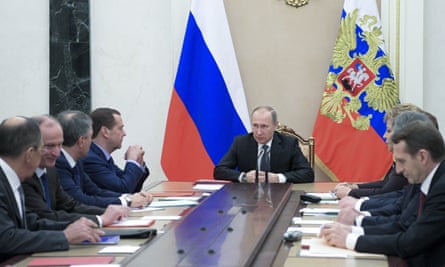
One former colleague said of Wood: “He’s a very respected senior diplomat. He was five years in Moscow. That says a lot for his reputation and his professional standing. He’s an outstanding analyst of developments in contemporary Russia.”
The colleague added: “He’s isn’t sort of black and white as you would expect, but takes a nuanced view. For a long time he’s been quite pessimistic about Russia’s trajectory under Putin. Wood doesn’t go in for hyperbole. He’s always analytical rather than polemical.”
Wood didn’t overlap in Moscow with Steele, who left the embassy in 1992. (Wood – previously ambassador in pre-war Yugoslavia – arrived in Russia in 1995.) But they got to know each other later: the world of old Moscow hands and London-based Kremlinologists is relatively small. Steele left MI6 and set up Orbis, his private business intelligence consultancy, in 2009.
“I didn’t work with him [Steele] in a professional capacity,” Wood told the Guardian.
Like other Putin watchers, Wood has tracked Russian attempts to influence western countries. This includes the recent spectacular hacking of Democratic National Committee emails, but also encompasses the Kremlin’s covert support for the far-right in Europe and the anti-establishment far left. He is acutely aware that there’s not much new here. The KGB carried out similar operations in Soviet times. They had a name: “active measures”.
Wood told the Guardian it was Trump’s own erratic behaviour on the campaign trail that had raised questions about his links with Russia. Trump originally denied that Putin had anything to do with hacking – only to say at his press conference earlier this week he thought Moscow was indeed guilty.
Confronted with serious hacking allegations, a presidential candidate would more usually call for a full inquiry, Wood said. Trump didn’t. “It colours the perception. Trump has encouraged the idea that there were meetings [between Trump aides and the Russian leadership],” Wood said, adding: “On the other hand, Trump says the first thing that comes into his head.”
The next few weeks will determine whether fears over Trump and Russia have been overblown, or whether they do indeed pose a threat to UK-US relations. One early test will be over sanctions imposed on Russia by the Obama administration in 2014. Will Trump bin them – as expected? Or wait?
Wood will be watching keenly. He thinks the new president has awkward questions to answer. He told the Guardian that if he could ask him just one, it would be this: “I would want to know what the US policy will be towards Russia, and on what basis?”
